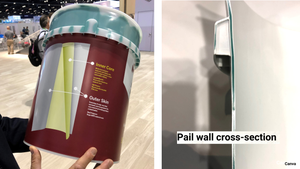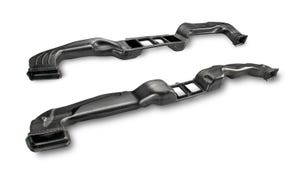Automakers' sustainable plastics use not a pretty picture
May 1, 2005
Although a recent report shows that no one carmaker turned in particularly strong grades for sustainable plastics use, U.S. automakers received nearly failing grades in the use of recyclable, "safe" plastics in vehicles.
This is according to a 56-page report released recently by the Ann Arbor, MI-based Ecology Center, in collaboration with NGO Clean Production Action. The six top-selling automakers in the U.S. were graded on their commitment to the use of environmentally friendly plastics. The report finds that all of the automakers still rely heavily on "petrochemical-based plastics," citing PVC as a prime example of an unsustainable plastic.
"Unfortunately, plastics used in cars today can emit toxic chemicals that are bad for public health and the environment," says lead report author Dr. Mark Rossi, research director of Clean Production Action. "The good news is that safer, less toxic plastics are readily available. American automakers just need to use them."
The report graded the six top-selling automakers in the U.S.-DaimlerChrysler, Ford, General Motors, Honda, Nissan, and Toyota-on 17 environmental topics related to plastics. Sustainable plastics are defined as those that don''t contain toxic chemicals, are recyclable, and are manufactured from renewable raw materials. Toyota led the group with a C, while Ford, DaimlerChrysler, and General Motors were among the lowest-scoring companies, all receiving Ds. "The fact that the top performer, Toyota, received a C grade means there is still a lot of room for improvement across the board," said Charles Griffith, auto project director at the Ecology Center.
The report also found that some foreign automakers are faring better in the area of sustainable plastics because the U.S. government lags behind Japan and the European Union in terms of recycling requirements and the elimination of toxic chemicals. GM even acknowledges that it focuses more on sustainable plastics through its European subsidiaries, such as Opel and Vauxhall.
"There''s a double standard. Why should a GM car in Europe have safer, more environmentally friendly plastic than one in the U.S.?" asks Griffith. The EU''s End-of-Life Vehicle (ELV) Directive sets goals for recycling rates (80% by 2006; and 85% by 2015). In addition, they are required to achieve reuse and recovery rates of 85% by 2006 and 95% by 2015. Japan, meanwhile, passed its Automobile Recycling Law, which mirrors the ELV Directive and requires achieving a recovery rate of 95% by 2015. Toyota is the only major automaker committed to implementing ELV-type activities in North America.
While the report found that progress toward sustainable plastics is slow overall, it also found positive examples of change. Toyota is making the most progress towards a comprehensive sustainable plastics program. It has developed one plastic made from renewable materials (a kenaf-fiber based polylactic acid resin) and another that can be close-loop recycled into the same product again. Toyota has also set clear, comprehensive, and measurable goals for sustainable plastics, and has committed to reduce its use of PVC.
This contrasts with GM, which was chided for having "little to highlight in terms of measurable goals and activities toward sustainable plastics." Nissan, DaimlerChrysler, and Ford were only a shade better than GM, according to the report.
Ambitious goals?
Report Recommendations
By 2009: eliminate the use of PVC plastic in vehicles sold globally.By 2010: design 95% of all plastic products to be either reusable or recyclable.By 2015: use 50% reused plastic products, recycled plastics, or plastics made from renewable resources at the global level.By 2020: use only plastics that are made without hazardous chemicals, are capable of being closed loop recycled, and are manufactured from renewable raw materials. Note: In 2004, the average U.S. passenger vehicle employed an estimated 257.5 lb of plastics, or 7.5% of overall weight.Stephen Moore [email protected]Contact information
The Ecology Center www.ecologycenter.org Clean Production Action www.cleanproduction.org
You May Also Like


